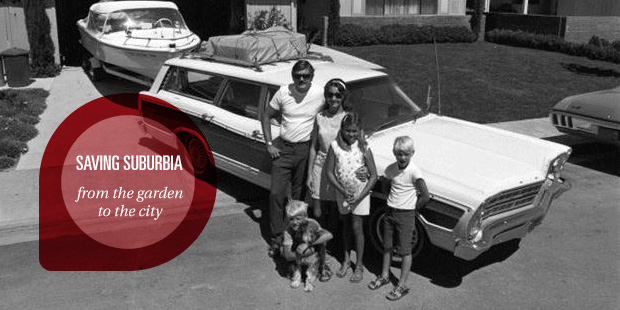
Saving Suburbia: From the Garden to the City
God is a God of community.
Before the beginning, the Father, Son, and Holy Spirit “did life together” in community. “In the beginning,” God created a perfect setting for community—Eden—for vertical connection with him, as well as horizontal connection with others. After the cleansing of the flood, God chose a particular people—a community—to tell his story and reveal his ways. And for the past two thousand years, the Bible says that his presence has not been contained by a tent or a building but is somehow found within in Christ-centered community: the church.
Humans, made in God’s image and for his purposes, are hard-wired for community.
However, today, the concept of community is being kidnapped from us:
- 3-car “garagescapes” have replaced tree-lined front porch landscapes
- Contemporary mega-churches (many with the word “community” in their name) feature darkened rows of attenders seeking anonymity
- The internal combustion engine killed Main Street, Elm Street, and the walkable scale of human towns
- Digital technology and social media seem to remove the need for actual physical spaces to connect with others
All of these changes are demonstrating that when we divorce the word community from the reality of a particular human-scaled place, we fundamentally lose something in the mix. Today, many church planters and next generation Christian leaders feel a calling to be “architects of community” in either urban or suburban settings. However, most are ill equipped to answer this call because they lack a biblical understanding of place and a historical understanding of terms like city and suburb.
Without an adequate theology of place, we resort to either devaluing it (throwaway church buildings) or overdoing it (by trying to re-build the temple). And without a greater understanding of how physical human ecologies and environments either facilitate or constrain community, we will fail to be truly present in the places and cities to which God has called us.
In light of this, we’ll consider a theology of place first, and then explore the tangible challenges we face for creating authentic community in our cities, with a special focus on the suburbs.
Mel McGowan, president and founder of Visioneering Studios, has written an inspiring and challenging treatise on the “place” of church in America today.
>>Download Saving Suburbia: From the Garden to the City here

Tags: Mel McGowan, Place, Saving Suburbia












